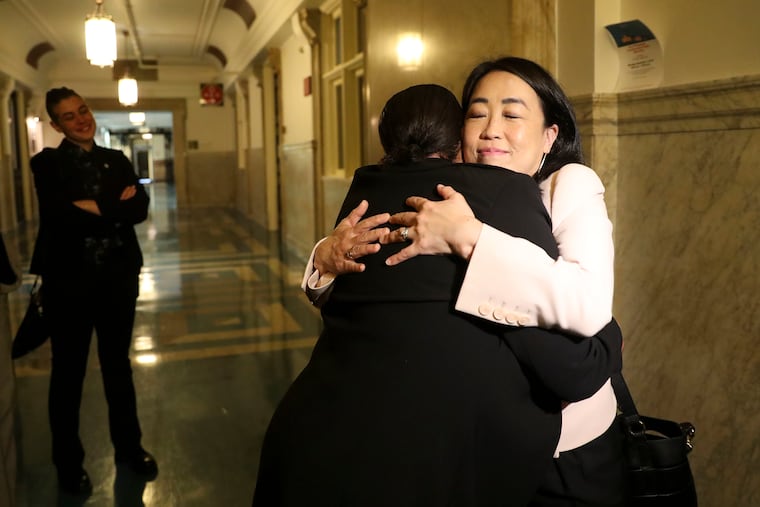Philly bill moves forward to provide free legal counsel for low-income tenants facing eviction
The bill, proposed by Councilmember Helen Gym, would give free legal representation to tenants whose annual gross income does not exceed 200% of the federal poverty guideline, or $24,980 for a single person.

Philadelphia City Council took a step toward strengthening tenants’ rights Tuesday when a committee voted in favor of a bill that would provide free legal counsel to low-income residents facing eviction.
The Committee on Law and Government voted unanimously to approve the bill, proposed last spring by Councilwoman Helen Gym amid what tenant advocates call an eviction crisis. Gym’s bill would provide legal representation to tenants whose annual gross income does not exceed $24,980 for a single person and $51,500 for a family of four. The full Council is likely to vote on the legislation in mid-November.
The approval comes amid increased focus on the growing number of evictions, caused in part by escalating housing costs, diminishing numbers of affordable units, and stagnating wages. Author and sociologist Matthew Desmond estimates that 2.3 million eviction notices were filed in the United States in 2016 — a rate of four every minute. In Philadelphia, tenant advocates say, the phenomenon is similarly severe, with more than 20,000 cases filed annually — ranking Philadelphia fourth-highest among large U.S. cities for total evictions, according to a database compiled by Desmond.
The problem is exacerbated, housing advocates say, by the disparity in legal representation in Philadelphia eviction court. Only about 11% of renters have attorneys, compared to nearly 80% of landlords, according to PhillyTenant.org, a collaborative project between local housing advocacy groups. Unlike criminal court, which provides court-appointed counsel, tenants in eviction court are often on their own.
“Without help navigating the complex rules and negotiating against trained lawyers ... poor tenants face an imbalance of power or are denied justice,” Ethan Fogel, a partner at Dechert LLP, said during the hearing. “They bear the risk of life-changing trauma of being forever shut out of the rental market."
In nearly two hours of testimony before a packed room, housing advocates, attorneys, and tenants told the five-person committee about the toll that eviction can take. Residents spoke about the fear of learning that landlords had filed evictions against them. In one case, a tenant said, it occurred after she had changed the locks and refused to pay rent because her landlord, she alleged, had failed to fix code violations and allowed potential buyers into her house without warning.
“No one should have to live in these conditions. No one should be evicted when they have done nothing wrong,” Laron Campbell, a tenant who lived in Southwest Philadelphia, read from written testimony. “Everyone deserves an attorney, someone to help them understand the process and stand up for them in court."
Throughout Tuesday’s testimony, advocates and attorneys regularly referenced a 2018 report by the Philadelphia Bar Association that found that when tenants were unrepresented, they faced “disruptive displacement” 78% of the time. In contrast, tenants who have attorneys have a 95% chance of avoiding eviction, said the study, which was based on research by Stout Risius Ross, a consulting firm.
Further, the report found, if the city were to invest $3.5 million annually to fund counsel for eligible low-income tenants, the city would save $45.2 million, in part, because evictions force the city to spend resources on sheltering homeless tenants and providing public benefits when jobs are lost. The report also noted that eviction can increase hospital and mental health costs, as well as juvenile delinquency.
The eviction problem in Philadelphia, according to a 2017 study by the Reinvestment Fund, disproportionately affects black residents.
The committee’s vote marks the latest advance in a two-year effort to reduce Philadelphia evictions — and follows similar “right to counsel” legislation that places including New York City have passed. Nearly two years ago, Philadelphia launched the pilot Philadelphia Eviction Prevention Project to provide more assistance. Since, according to PhillyTenant.org, more than 2,000 tenants facing eviction received legal aid, and nearly 3,700 received advice from a tenant helpline.
Additionally, an editorial written by Philadelphia Bar Association attorneys said, the project helped decrease the number of Philadelphia eviction filings by 10%.
No one spoke Tuesday against the bill, though the Greater Philadelphia Association of Realtors submitted testimony in opposition. In the letter to the committee, Chris Somers, president of the association, said the bill discriminates against “property owners, who cannot or do not have the financial capability to engage lawyers.” He added that “the city is unfairly tipping the scale by deciding to interject in a civil case."
In an interview after the vote, Somers added that the bill could dissuade Philadelphians from investing in rental properties.
“That’s already been the case with the combination of property assessments increasing every year ... with increased onerous provisions like lead-based paint from [Councilwoman] Blondell Reynolds Brown,” he said.
Funding for the tenant representation would come from the Low-Income Tenant Legal Defense Fund, which Gym said was started in 2017 with a $500,000 allocation. Today, she said, that fund contains $2.1 million, in part because of a $1.5 million commitment in the city’s 2020 fiscal budget.
“With a population of almost 375,000 people living below the poverty line, we know that we cannot afford to be on the back end of things,” Gym said in an interview. “We need to take bold and affirmative action.”
Gym’s bill would apply to all tenants in Philadelphia who meet income guidelines, including those in Philadelphia Housing Authority properties. Tenants can be represented only by nonprofit legal organizations.
The Inquirer is one of 21 news organizations producing Broke in Philly, a collaborative reporting project on solutions to poverty and the city’s push toward economic justice. See all of our reporting at brokeinphilly.org.